QuestionI have a Long Hair Chihuahua and I can't seem to house break her. I have scolded her on many occasions for doing her business inside the house and then I would let her outside, this has not worked.I keep her in a cage at night and she does not do anything until I let her outside in the morning, so I know that their is nothing wrong with her. The fact of the matter is she goes where she wants inside or outside its just a matter of timing if she is inside an has to go she will.I think she knows that it is wrong because she does not do it in front of me or anybody else who maybe around.
AnswerHi Michael!
chihuahuas are very smart little dogs, but you have to show them who is boss! lol
I found this article on housebreaking on the internet one time and have saved it to pass on with others who are having the same problem as you. I completely agree with the training in this article and feel that if you follow it, you will housebreak your little chi! Please see below.
God Bless,
Becky
PUPPY HOUSEBREAKING TIPS
Puppy housebreaking can be accomplished by many different methods. Keep in mind that puppies are unable to fully control their bowels until they are a few months old. You will have some success during the early months; however, you should expect a few accidents. To avoid difficult clean-ups, keep puppies supervised at all times until you are certain that your pup is housebroken. Once you allow your pup to urinate in the house, he is likely to return to the same spot the next time he has to relieve himself.
Your puppy should be let outside to potty just before you retire for the night. Likewise, as soon as he wakes up in the morning, the first thing your pup will need to do is relieve himself. You should waste no time in taking him outside as soon as he awakes. When your pup hears you get up in the morning, it will be his signal to wake, so attend to him before going about your morning routine. Some pups may cry that they need to go outside at the first sign of light, and if you want a dry floor, it is usually necessary to immediately respond to their needs.
Your pup will also have to relieve himself shortly after a meal, and will need to urinate more often during the summer when his water intake is higher. As soon as your pup finishes dinner, place him outside for several minutes until he potties. At other times, you may notice your pup sniffing the floor for a suitable place to relieve himself. He may whimper or start to squat. Scoop him up immediately and place him outside.
Puppy Housebreaking may be quickened if your pup sleeps in his crate. Dogs dislike sleeping in a soiled area, and your pup will soon learn to wait until you let him out of his crate to do his business. Of course, it may take a few months before your pup is able to hold his bowels all night. As he gets older, he will have fewer and fewer accidents. Expect this, and never scold him for accidentally soiling his area at night.
If your puppy does have an accident during the day, only scold him if you catch him in the act. If you scold him even a minute or two after he has pottied, it will confuse him because he will not know why he is being scolded. If, however, you catch him in the act of relieving himself in the house, pick him up and say "No" in a firm voice. Do not yell at the pup. Immediately take him to the outside area where you want him to potty. Never rub his nose in the mess or hit him; this will cause him to fear you and will make future obedience training more difficult. Be sure to clean the soiled area with a product intended for housebreaking accidents. It should be formulated to remove both the stain and the odor so your pup will not be tempted to soil the same spot.
These training tips apply both to puppies and older dogs. For older puppies and dogs that continue to wet in the house, we recommend belly bands, which absorb wetness and prevent staining on carpets and furniture. click here
Housebreaking pads help to quickly housebreak pups. These pads are scented with attractants, and will encourage your pup to eliminate on the pad and not on your carpet. For the first few weeks, when you cannot watch your pup in the house, confine him to an area with an easy-to-clean flooring such as a kitchen. Place the pad on the floor. Your pup will learn to relieve himself on the specially scented pad. Eventually, you can move the pad closer and closer to the back door, and then place the pad outside. Once your pup learns to use the outdoors to relieve himself, you will no longer need to use the pads.
Remember, you are the greatest aid to your puppy's success. Be consistent and available to his needs. With your consistency, soon your pup will become completely trained.
Puppy Housebreaking Problems
Some common issues and what to do.
When your pup says, "I am NOT going to go potty now!"
1. Be very patient. Do not let the pup talk you into playing.
2. Try to go to the same area, leave a scent pad for reminder.
3. Be very quiet. DO NOT distract the pup from his purpose.
4. Confine the pup in small area until outside success is achieved.
5. Use another dog to prompt pup. Remember - no playing.
But I want to eat my feces!
1. Brought on by example, influenced by the desire to be clean.
2. Usually occurs when pup has been bored, alone, or confined.
3. Use a product called Forbid.
4. Can be hormonally triggered in females.
Diarrhea causes difficulty in housetraining!
1. Remember when you couldn't hold it?
2. Try to be patient as loose bowels create the need to go often.
3. Could be caused by worms (even microscopic).
4. If worms are present have your veterinarian de-worm, or use an over-the-counter wormer, following directions carefully.
5. Could even be caused by the food you eat and share.
6. Ask your vet about dosage before treating with Pepto Bismol, Imodium AD or other binder.
7. If there is blood in the stool, contact your veterinarian right away.

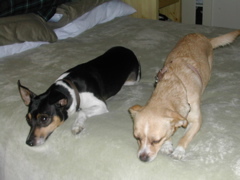 Vicious fighting between two females
Question
Alice and Julia
I have two female rescue dogs
Vicious fighting between two females
Question
Alice and Julia
I have two female rescue dogs
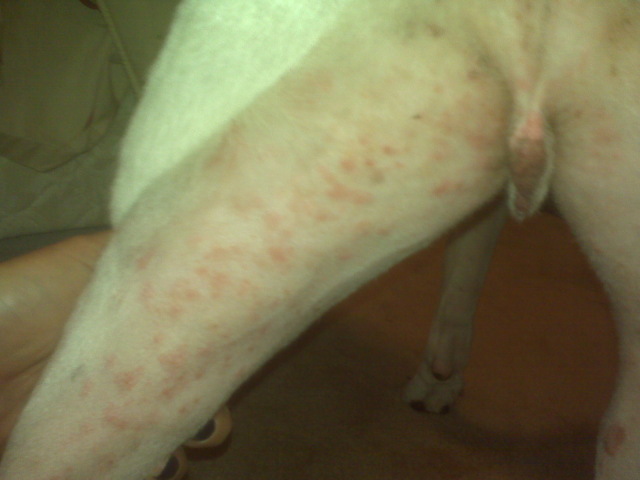 Large dog with possible poison ivy
Question
Guero
My poor dog has led a rough life to date
Large dog with possible poison ivy
Question
Guero
My poor dog has led a rough life to date
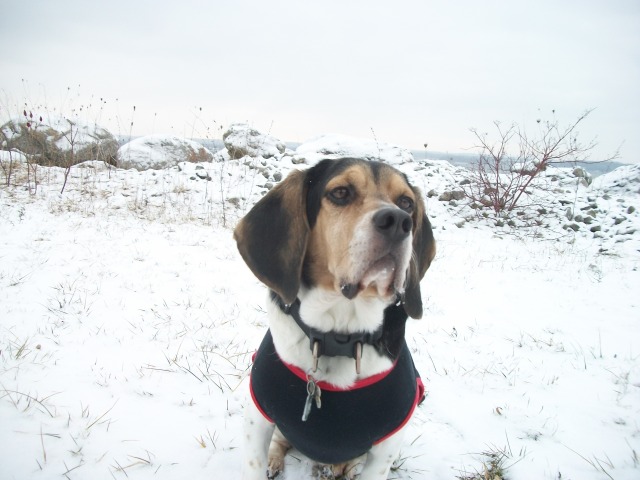 2nd Dog
Question
Winston
Hi, I have a beagle/bassest hou
2nd Dog
Question
Winston
Hi, I have a beagle/bassest hou
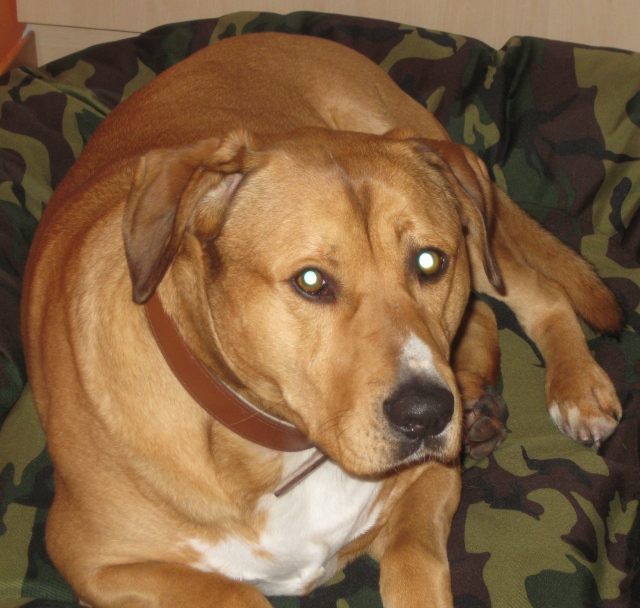 Strange dog behaviour ; organic brain syndrome in canine;
Question
Alfie
All of a sudden my 4 year old dog does n
Strange dog behaviour ; organic brain syndrome in canine;
Question
Alfie
All of a sudden my 4 year old dog does n
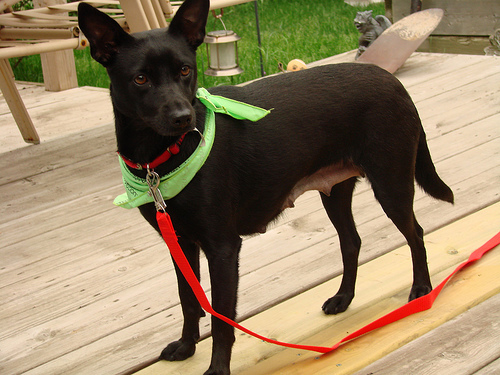 Guessing my dogs mix
Question
matilda
I was wondering if you could help what
Guessing my dogs mix
Question
matilda
I was wondering if you could help what